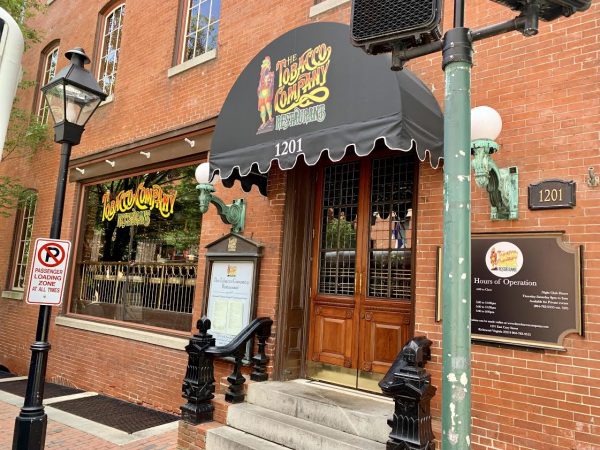
The Tobacco Company Restaurant is among several eateries in town whose owners say they were blindsided by high bills from the city related to meals tax payments. (BizSense file)
Publicity about escalating penalties and fees tied to multiple Richmond restaurants’ meals tax payments are prompting changes to the city’s tax collection practices on a broader scale.
City officials are proposing administrative and legislative changes to how taxes are collected and penalties are applied in response to recent media reports about restaurants that have been hit with high tax bills due to unknown late fees and interest charges accruing over time.
The recommendations were shared with City Council members last Thursday in a memo from Chief Administrative Officer Lincoln Saunders, who noted the media attention in presenting the proposals.
While the city continues to work on rolling out an online payment system called RVAPay, Saunders said other changes also are needed and planned to address the issues that in some businesses’ cases snowballed to tens or even hundreds of thousands of dollars owed to the city.
“Many of you have reached out to me to ask what more we can do to be more supportive to our restaurants, small businesses, residents, and other taxpayers,” Saunders said in the memo. “Over the past week or more, the Department of Finance, the City Attorney, and I have explored ways we can improve our services and enhance flexibility in payments and collections of past-due balances.”
The recommendations include amending city code to allow tax payments to be applied to the month they are made, rather than applying them first to delinquent balances as is currently required by a state law. The practice has resulted in a snowball effect in which tax payments are put toward unknown penalties, leaving only part of the balance paid and racking up additional penalties without notice to the taxpayer.
The local code change would effectively circumvent the state law, which requires the payments on delinquent accounts “unless otherwise provided by ordinance of the governing body,” according to the law that could also be revised by proposed legislation in the Virginia General Assembly.
Senate Bill 294, introduced last week by Sen. Bill DeSteph of Virginia Beach, would require Richmond and any other locality in the state to apply meals tax payments to the tax returns they accompany, or according to written instructions from the taxpayer.
It also would freeze interest on any unpaid balances 90 days after an appeal or legal challenge is filed; notify taxpayers of delinquent meals taxes before issuing any liens or levies to collect them; and allow taxpayers to be awarded attorney’s fees if they prevail in a dispute.
The bill was co-patroned by Sen. Christie New Craig of Chesapeake and referred to the Senate’s Committee on Finance and Appropriations, which could consider it in an upcoming meeting. This year’s assembly session got underway last week and is scheduled to run through March.
Richmond’s tax policy changes would also address interest and late-payment penalties applied on personal property taxes, which are currently assessed a 10 percent penalty and 10 percent interest the first day a payment is delinquent, according to Saunders’ memo. The change would reduce the penalty to 2 percent for the first month and hold off interest until the following month.
Payment plans offered to taxpayers would be extended from five years to six years, in accordance with a change that was approved in last year’s assembly session. Saunders said the city also plans to offer different repayment terms for individuals and businesses, and to lower the minimum down payment required to enter a payment plan.
Other proposed changes include electronic bill payment options, removing convenience fees for payments made using a credit card, and outreach to businesses about the city’s billing and taxation practices.
The city also is seeking an update to state law to allow discretion on the application of a seller’s commission for businesses that collect meals taxes. Adopted in 2018 – the same year that Richmond increased its meals tax to 7.5 percent per meal sold in the city – the commission allows businesses to keep a percentage of the meals taxes they collect to cover credit card processing fees used in collecting that tax.
Because state law only allows localities to provide the commission to businesses that are in “good standing,” Saunders said it has “created some of the more significant delinquent balances” among restaurant owners in the city. Richmond is seeking the law change through legislation that’s set to be introduced by Del. Michael Jones, a former Richmond councilmember and its president last year.
Current President Kristen Nye said the proposed changes are to be introduced at council’s next meeting on Monday. She described the recommendations as first steps toward a long-term goal of addressing issues with tax collection that have been occurring for years.
“We’re trying to see ways that we can change processes, change legislation, just to make things easier for our business owners and our residents,” Nye said Tuesday.
“We’ve had some practices in (the finance department) and also some challenges with lack of technology that have been making things cumbersome and clunky for our residents and business owners for a long time, so I think the memo is a good start.”
Nye acknowledged that the issues have been known for some time but are getting increased attention following media coverage that followed some restaurant owners airing their grievances publicly. Some have said their experiences dealing with the issues are driving them to take their business out of the city.
“I think maybe there wasn’t a recognition of how many people were having issues, and in the past month, with the media attention and the number of people who have proactively reached out to us, it’s become more apparent that there are specific, common issues between a lot of these business owners that we could address legislatively,” Nye said.
“It’s always a concern when people are saying they want to leave Richmond because they don’t feel supported by the government and they don’t feel like we are welcoming to small businesses. I personally love the restaurant scene here in Richmond, and I’m so grateful to everybody who’s been a part of that, I want to do what I can in my role to help continue to support our small businesses.”
Adding that communication with businesses has also been an issue, Nye said, “It’s something that I’m working closely with the administration on, finding some resolution to the communication issues.”

The Tobacco Company Restaurant is among several eateries in town whose owners say they were blindsided by high bills from the city related to meals tax payments. (BizSense file)
Publicity about escalating penalties and fees tied to multiple Richmond restaurants’ meals tax payments are prompting changes to the city’s tax collection practices on a broader scale.
City officials are proposing administrative and legislative changes to how taxes are collected and penalties are applied in response to recent media reports about restaurants that have been hit with high tax bills due to unknown late fees and interest charges accruing over time.
The recommendations were shared with City Council members last Thursday in a memo from Chief Administrative Officer Lincoln Saunders, who noted the media attention in presenting the proposals.
While the city continues to work on rolling out an online payment system called RVAPay, Saunders said other changes also are needed and planned to address the issues that in some businesses’ cases snowballed to tens or even hundreds of thousands of dollars owed to the city.
“Many of you have reached out to me to ask what more we can do to be more supportive to our restaurants, small businesses, residents, and other taxpayers,” Saunders said in the memo. “Over the past week or more, the Department of Finance, the City Attorney, and I have explored ways we can improve our services and enhance flexibility in payments and collections of past-due balances.”
The recommendations include amending city code to allow tax payments to be applied to the month they are made, rather than applying them first to delinquent balances as is currently required by a state law. The practice has resulted in a snowball effect in which tax payments are put toward unknown penalties, leaving only part of the balance paid and racking up additional penalties without notice to the taxpayer.
The local code change would effectively circumvent the state law, which requires the payments on delinquent accounts “unless otherwise provided by ordinance of the governing body,” according to the law that could also be revised by proposed legislation in the Virginia General Assembly.
Senate Bill 294, introduced last week by Sen. Bill DeSteph of Virginia Beach, would require Richmond and any other locality in the state to apply meals tax payments to the tax returns they accompany, or according to written instructions from the taxpayer.
It also would freeze interest on any unpaid balances 90 days after an appeal or legal challenge is filed; notify taxpayers of delinquent meals taxes before issuing any liens or levies to collect them; and allow taxpayers to be awarded attorney’s fees if they prevail in a dispute.
The bill was co-patroned by Sen. Christie New Craig of Chesapeake and referred to the Senate’s Committee on Finance and Appropriations, which could consider it in an upcoming meeting. This year’s assembly session got underway last week and is scheduled to run through March.
Richmond’s tax policy changes would also address interest and late-payment penalties applied on personal property taxes, which are currently assessed a 10 percent penalty and 10 percent interest the first day a payment is delinquent, according to Saunders’ memo. The change would reduce the penalty to 2 percent for the first month and hold off interest until the following month.
Payment plans offered to taxpayers would be extended from five years to six years, in accordance with a change that was approved in last year’s assembly session. Saunders said the city also plans to offer different repayment terms for individuals and businesses, and to lower the minimum down payment required to enter a payment plan.
Other proposed changes include electronic bill payment options, removing convenience fees for payments made using a credit card, and outreach to businesses about the city’s billing and taxation practices.
The city also is seeking an update to state law to allow discretion on the application of a seller’s commission for businesses that collect meals taxes. Adopted in 2018 – the same year that Richmond increased its meals tax to 7.5 percent per meal sold in the city – the commission allows businesses to keep a percentage of the meals taxes they collect to cover credit card processing fees used in collecting that tax.
Because state law only allows localities to provide the commission to businesses that are in “good standing,” Saunders said it has “created some of the more significant delinquent balances” among restaurant owners in the city. Richmond is seeking the law change through legislation that’s set to be introduced by Del. Michael Jones, a former Richmond councilmember and its president last year.
Current President Kristen Nye said the proposed changes are to be introduced at council’s next meeting on Monday. She described the recommendations as first steps toward a long-term goal of addressing issues with tax collection that have been occurring for years.
“We’re trying to see ways that we can change processes, change legislation, just to make things easier for our business owners and our residents,” Nye said Tuesday.
“We’ve had some practices in (the finance department) and also some challenges with lack of technology that have been making things cumbersome and clunky for our residents and business owners for a long time, so I think the memo is a good start.”
Nye acknowledged that the issues have been known for some time but are getting increased attention following media coverage that followed some restaurant owners airing their grievances publicly. Some have said their experiences dealing with the issues are driving them to take their business out of the city.
“I think maybe there wasn’t a recognition of how many people were having issues, and in the past month, with the media attention and the number of people who have proactively reached out to us, it’s become more apparent that there are specific, common issues between a lot of these business owners that we could address legislatively,” Nye said.
“It’s always a concern when people are saying they want to leave Richmond because they don’t feel supported by the government and they don’t feel like we are welcoming to small businesses. I personally love the restaurant scene here in Richmond, and I’m so grateful to everybody who’s been a part of that, I want to do what I can in my role to help continue to support our small businesses.”
Adding that communication with businesses has also been an issue, Nye said, “It’s something that I’m working closely with the administration on, finding some resolution to the communication issues.”






Pretty disgraceful that our city needs legislation to simply notify its constituents of penalties and interest it is levying upon them for any reason, whether valid or invalid. How does anyone in charge think they are doing a good job? No business would survive treating its customers this way.
And to add to it Chris, the City discussed “over the last week” and the GA changes are coming from members NOT representing the City. Like this problem just popped up and no one was addressing it until last week. It only moved forward cause of new articles. WOW!
The city needs to add real estate taxes to its list of payment reforms as well. I had the same experience with an undelivered bill that triggered the revoking of a tax abatement that snowballed into successive penalties and late charges, despite paying all current bills in full.
Then I had the same experience again the next year when I bought a new property and the city retroactively revoked the abatement after I had closed on the property.
If they are going to remove the convenience fee for restaurants when paying their tax bill on line when using a credit card, they need to do the same for everybody when paying a utility bill on line with the city of richmond, you get hit with a convenience fee for both credit card and bank draft payments. Thats something Henrico doesnt do on its utility payment portal. Im a Henrico res but still pay my gas bill to the COR.
What a shame the city waits for enough negative publicity to be their impetus for change. Seems to be their litmus test for actually doing anything. How much inefficiency and disorganization can we get away with before we’re held accountable? Imagine this happening in the private sector. They’d be out of business in 6 months.
And the Mayor wants to be the next Governor? All his opponents have to do is replay the job he has done as Mayor of the City? He was going to fix these problems 6 years ago!
Shame on anyone who believed he was actually capable of: “fix these problems 6 years ago”. The most experience he had a slashing the tires of his political opponents. And he’s done such a great job in Richmond he deserves to be Governor…. We’re living in an upside down world.
“Plans to offer” and “will be able to” are not the same as “can”. I’ve been hearing “plans to offer” and “will be able to” since I moved my business here in 2015, when my proof of payment for the business license was literally a screenshot of a Windows desktop in the Finance Dept. I can’t believe that the department still has not been fixed. Before any casino, ballpark, or whatever — fixing the Finance Dept should have been job #1, but so many of us were afraid to speak out for fear of retaliation. I’m glad the issue is… Read more »